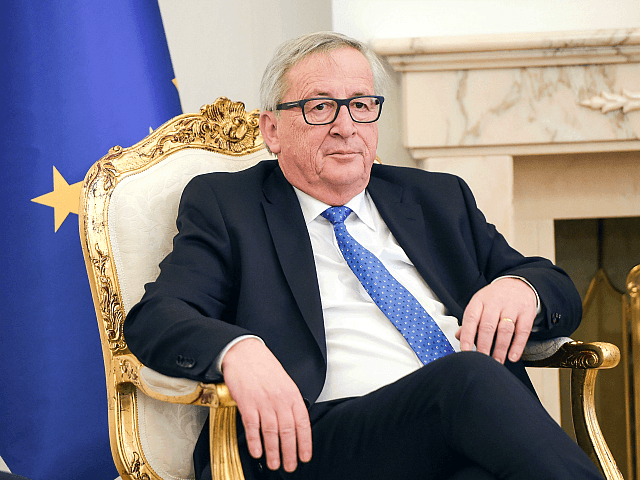President Trump Gets Tough on EU After Juncker T
Post# of 65629

After Juncker Threatens Taxes on Jeans,
Bourbon, and Harley-Davidsons < >
Globalist piece of shit

U.S. President Donald Trump is getting tough on the European Union, after the bloc’s unelected leaders threatened to levy punitive tariffs on iconic American brands in response to his attempts to protect American steelworkers.
“So now we will also impose import tariffs,” threatened Jean-Claude Juncker, the president of the unelected European Commission, at a black-tie event in Hamburg, Germany.
“This is basically a stupid process, the fact that we have to do this. But we have to do it. We will now impose tariffs on motorcycles, Harley-Davidson, on blue jeans, Levis, on bourbon. We can also do stupid. We also have to be this stupid,” he huffed.
Unphased, the U.S. President fired back on Twitter: “If the EU wants to further increase their already massive tariffs and barriers on U.S. companies doing business there, we will simply apply a Tax on their Cars which freely pour into the U.S.,” he wrote.
“They make it impossible for our cars (and more) to sell there. Big trade imbalance!”
While the mainstream media in Britain and Europe has gone out of its way to paint President Trump’s proposed aluminium and steel tariffs as unreasonable, it is true that the EU imposes tariffs of 10 per cent on American cars, while the U.S. imposes tariffs of just 2.5 per cent on EU-made cars — making American cars more expensive for British consumers and hurting American exporters.
If the E.U. wants to further increase their already massive tariffs and barriers on U.S. companies doing business there, we will simply apply a Tax on their Cars which freely pour into the U.S. They make it impossible for our cars (and more) to sell there. Big trade imbalance!
The looming prospect of what European Commission Vice-President Jyrki Katainen is describing as a “trade war” spells bad news for the United Kingdom, as the EU controls the trade policy of its member-states and Prime Minister Theresa May does not appear to be interested in changing this until after a long ‘transition period’ following Brexit in 2019.
While Jean-Claude Juncker’s countrymen in Luxembourg might be little affected by U.S.-EU tariffs, this will not be the case in Britain, as the U.S. is its single largest trading partner as a country.
British consumers will not just find themselves facing higher prices when purchasing popular products such as Jack Daniels whiskey and Levis jeans — British car manufacturers would also be hit hard by large tariffs on EU-made cars, as the U.S. is an important and growing export market for them.
If the United Kingdom controlled its own trade policy, it is very possible it could have avoided this situation entirely — as U.S. tariffs on foreign aluminium and steel are really aimed at state-subsidised producers in the People’s Republic of China, not Europe.
However, the tariffs apply to the EU as well because the World Trade Organization’s ‘most favoured nation’ rules require the U.S. to treat all third countries the same unless they have a trade deal — and the EU has consistently failed to negotiate one.
While the Trump administration is keen to strike a “very big, very powerful” deal with Britain, this will not be possible until it is fully out of the European Union, meaning it is likely to be dragged into the coming economic conflict if Theresa May does not act quickly.
 (0)
(0) (0)
(0)